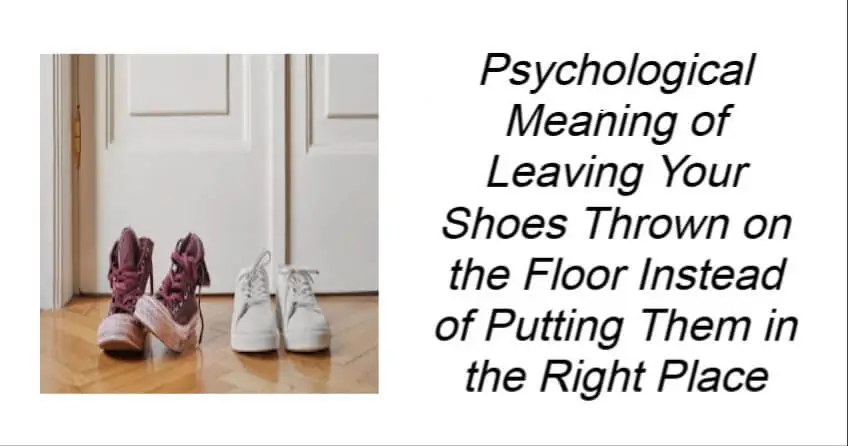Psychological Meaning of Leaving Your Shoes Thrown on the Floor Instead of Putting Them in the Right Place
Leaving your shoes on the floor might seem like a simple oversight—but from a psychological standpoint, this everyday behavior can offer a surprising glimpse into your emotional state and personality.
Let’s explore what this small habit might reveal about your mental space, personal priorities, and even your relationships.
1. The Psychology of Clutter
Our physical environment often mirrors our inner world. According to the psychology of clutter, disorganization in our surroundings can reflect stress, emotional overload, or mental fatigue.
– Stress and Anxiety
When life feels overwhelming, small tasks like putting shoes away often fall by the wayside. This may signal a sense of losing control or simply being mentally exhausted.
– Procrastination
Delaying minor actions—like tidying up—can be a sign of procrastination. It may point to struggles with motivation, time management, or emotional resistance to routine.
2. How Environment Reflects Personality
Not everyone views mess the same way. Some people thrive in perfectly organized spaces, while others function well amidst a bit of chaos.
– Personality Types
Those with a relaxed or easygoing personality may not prioritize tidiness. This doesn’t mean they’re careless—it may simply reflect different values or priorities.
– Creativity and Clutter
Interestingly, clutter has been linked to creativity. Research suggests that a slightly disordered space may encourage out-of-the-box thinking. So, that pile of shoes could belong to a highly imaginative mind.
3. Cultural and Social Norms Around Shoes
The meaning of leaving shoes on the floor varies across cultures and contexts.
– Cultural Expectations
In many Asian households, shoes are removed at the door to maintain cleanliness. In other cultures, shoes scattered around might be seen as laziness or disrespect.
– Social Judgments
In environments where neatness is a social expectation, visible clutter—including shoes—can lead to negative assumptions about your character or habits.
4. The Emotional Ripple Effect
This behavior may also affect how we see ourselves—and how others see us.
– Self-Image and Esteem
Our surroundings can influence how we feel about ourselves. Living in clutter, even minor, can contribute to feelings of guilt, shame, or being “out of control.”
– Impact on Relationships
Discrepancies in household habits—like one partner leaving shoes around while the other values order—can lead to friction. It’s often less about the shoes and more about communication, expectations, and mutual respect.
5. What You Can Do About It
If this habit is causing stress or tension, there are simple strategies to help shift it.
– Establish Small Routines
Create a quick habit: take 10 seconds to put your shoes away when you walk in. Over time, it becomes second nature.
– Reflect on the Why
Ask yourself: Am I feeling stressed, rushed, or disconnected? Exploring the emotional roots of everyday behaviors can lead to real insights.
– Communicate with Others
If shared space is an issue, talk openly with housemates or partners. Clear communication helps align expectations and avoid unnecessary conflict.
Final Thought
Leaving shoes on the floor might seem insignificant, but it often reflects something deeper—whether it’s stress, creativity, personality, or even cultural perspective. Understanding the meaning behind this simple action can help you become more self-aware and mindful of how your space influences your emotions and relationships.
So next time you see a pair of shoes left behind, pause and ask: What does this say about where I am right now?
You’ve just read, Psychological Meaning of Leaving Your Shoes Thrown on the Floor. Why not read Manager Had To Hire A New Employee.

